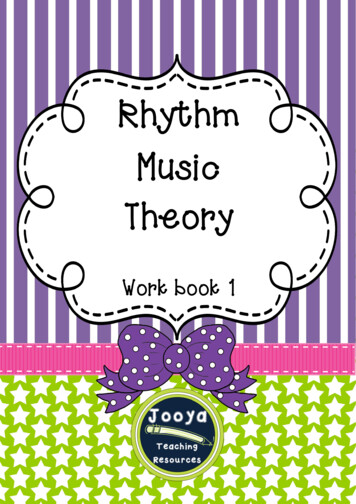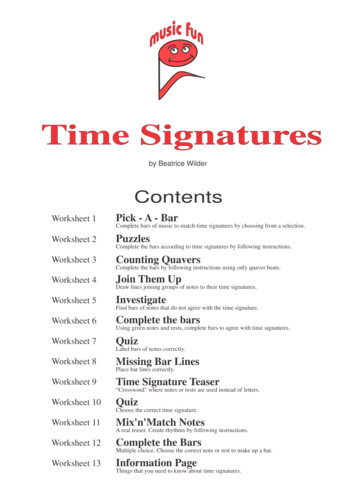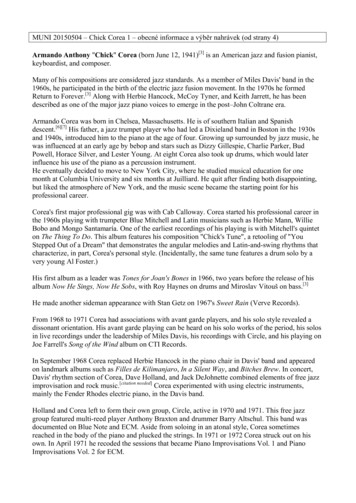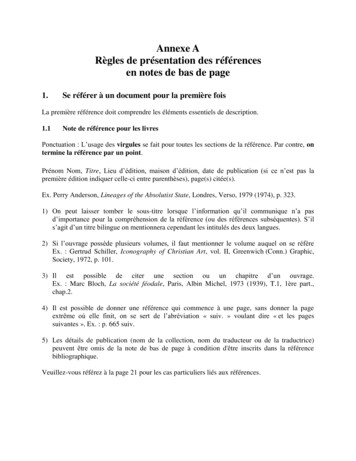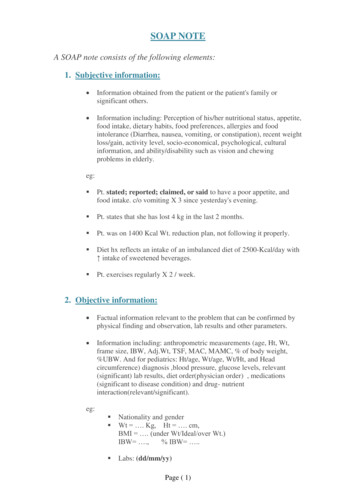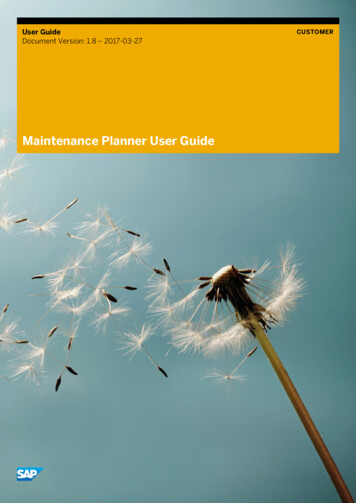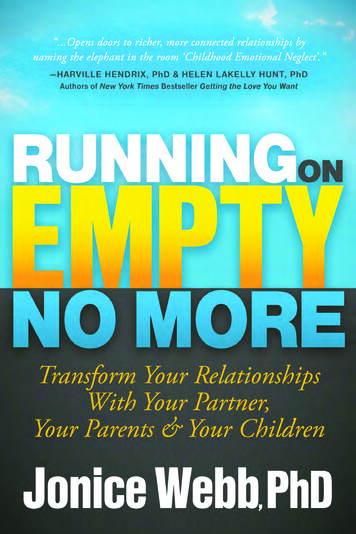
Transcription
A NOTE FROM DR. JONICE WEBBThank you for purchasing my new book,Running on Empty No More: TransformYour Relationships With Your Partner,Your Parents & Your Friends! I’m soglad you have decided to take on theChildhood Emotional Neglect (CEN)that is blocking you from the most important people in your life. I am surethat you will identify with some of the lovely people you will meet in thesepages, and you will see your struggles in theirs. You haven’t just bought abook, you have joined a community, and I look forward to walking throughyour healing process with you!Sincerely,Dr. Jonice Webb
Praises for Running on Empty No MoreJonice Webb opens doors to richer, more connected relationships bynaming the elephant in the room “Childhood Emotional Neglect” andoffering readers clear guidance and support to talk with their loved oneson a new and deeper level. This book will speak to many.”—Harville Hendrix, Ph. D. and Helen LaKelly Hunt, Ph. D.,authors of Getting the Love You Want: A Guide for Couplesand The Space Between: The Point of ConnectionFilled with examples of well-meaning people struggling in theirrelationships, Jonice Webb not only illustrates what’s missingbetween adults and their parents, husbands and their wives, and parentsand their children; she also explains exactly what to do about it.—Terry Real, internationally recognized family therapist, speakerand author, Good Morning America, The Today Show, 20/20, Oprah andThe New York TimesHow can parents change their interactions with their childrento provide them with the emotional validation they need in order togrow into healthy, strong adults? Can relationships with emotionallyneglectful parents be healed? How do you reach out to an emotionallyneglectful partner or spouse? By combining riveting, personal vignetteswith clear, practical exercises and touches of humor, Running on EmptyNo More answers all of these questions in a way that will validate andmotivate readers.—Randi Kreger, nationally recognized speaker and experton borderline personality disorder and author of the internationalbestsellers, Stop Walking on Eggshells and The Essential Family Guide toBorderline Personality Disorder. Founder of BPDcentral.comDr. Jonice Webb describes the almost indescribable in a way you canunderstand. Childhood emotional neglect can cause trauma and longlasting devastating effects on emotional development and relationships.Embrace it now. In Dr. Webb’s book, Running on Empty No More, youwill find practical solutions for everyday life to heal yourself and yourrelationships. This is a terrific new resource that I will be recommendingto many clients now and in the future!—Dr. Karyl McBride, author of Will I Ever Be Good Enough?Healing the Daughters of Narcissistic Mothers andWill I Ever Be Free of You? How to Navigate a High-ConflictDivorce from a Narcissist and Heal Your FamilyJonice Webb has hit another home run with her book, Running on EmptyNo More. A well-organized and comprehensive book about the practicalside of Childhood Emotional Neglect (CEN), Dr. Webb’s work is especiallypoignant because the material is fresh and relevant, the explanations areclearly articulated, and her writing style is refreshingly down-to-earthand accessible. Clinicians like myself as well as the lay reader will findthis book to be a necessary companion to her break-through bestseller,Running on Empty, which introduced a topic that needed to see the lightof day. As an amorphous but wide-spread condition, readers of her firstbook will applaud Dr. Webb’s use of illustrative case examples, step bystep instructions, practical exercises and skill building worksheets. Iwill be recommending this book to my clients, and to those who wantto understand that CEN is not curse, but a legitimate psychologicalcondition which a person can overcome.—Ross Rosenberg, M.Ed., LCPC, CADC, author of The HumanMagnet Syndrome: Why We Love People Who Hurt UsIn Dr. Jonice Webb’s second book, Running on Empty No More,she turns the powerful lens of Childhood Emotional Neglect fromhealing the individual to strengthening and deepening the most importantrelationships in our lives. She answers questions like:Dr. Webb’s first book, Running on Empty, was a paradigm-changer. InRunning on Empty No More, which is helpful for laypeople and cliniciansalike, she expands on the idea of Childhood Emotional Neglect andprovides readers with concrete ways to change their interactions with
the people most important to them. Written in easy-to-understand butdescriptive language, with lots of examples, Dr. Webb helps readers learnhow to create healthier, more expressive, and more fulfilling relationshipswith the central people in their lives.—Samantha Rodman, PhD, LLC, Founder of Drpsychmom.comand author of 52 Emails to Transform Your Marriageand How to Talk to Your Kids About Your Divorce.RUNNINGONEMPTYNO MORETransform Your RelationshipsWith Your Partner,Your Parents and Your ChildrenJonice Webb, PhDNEW YORKLONDON NASHVILLE MELBOURNE VANCOUVER
RUNNING ON EMPTY NO MORETransform Your Relationships With Your Partner,Your Parents and Your Children 2018 JoniceWebb, PhDAll rights reserved. No portion of this book may be reproduced, stored in a retrievalsystem, or transmitted in any form or by any means—electronic, mechanical,photocopy, recording, scanning, or other‚—except for brief quotations in criticalreviews or articles, without the prior written permission of the publisher.Published in New York, New York, by Morgan James Publishing. Morgan James is atrademark of Morgan James, LLC. www.MorganJamesPublishing.comThe Morgan James Speakers Group can bring authors to your live event. For moreinformation or to book an event visit The Morgan James Speakers Group atwww.TheMorganJamesSpeakersGroup.com.ISBN 978-1-68350-673-7 paperbackISBN 978-1-68350-674-4 eBookLibrary of Congress Control Number: 2017911451Cover Design by:Rachel Lopezwww.r2cdesign.comInterior Design by:Bonnie BushmanThe Whole Caboodle Graphic DesignAuthor photo by:Sue Bruce PhotographyIn an effort to support local communities, raise awareness and funds, Morgan JamesPublishing donates a percentage of all book sales for the life of each book toHabitat for Humanity Peninsula and Greater Williamsburg.Get involved today! Visitwww.MorganJamesBuilds.comFor My Clients
TABLE OF CONTENTSAcknowledgmentsIntroductionThe Three Big Questions I Get Most Often:PART 1: CEN AND YOUR RELATiONSHiPChapter 1: The CEN Relationship: A PortraitWhen One Partner Has CENWhen Both Partners Have CENChapter 2: Did CEN Affect Your Choice of Partner?Five Ways CEN Can Affect Your Choice of PartnerSummaryChapter 3: The Effects of CEN on Your RelationshipThe Four Skill Sets Required for an Emotionally ConnectedRelationshipHow to Know If Your Relationship Is Affected by CENThe Chasm That Forms in the CEN RelationshipChapter 4: How to Talk to Your Partner about CENBefore You Talk with Your PartnerWhat to Expect: The Elements of a Successful Talk about CENWhat to Do If You Both Have CENWhat to Do If You Cannot Reach Your PartnerChapter 5: How to Repair Your CEN RelationshipConnection-Building ExercisesConflict Management ExercisesPortrait of a Couple’s CEN 85658
x RUNNING ON EMPTY NO MORETAbLE Of CONTENTS xiPART 2: YOUR CEN PARENTS61Chapter 6: The Emotionally Neglectful Family All Grown Up:633 PortraitsThe Well-Meaning-But-Neglected-Themselves Parents (WMBNT) 63The Struggling Parent66The Self-Involved Parent68Chapter 7: How CEN Affects Your Relationship with Your Parents 71The Three Types of Emotionally Neglectful Parents & How72to Identify ThemWhat You May Be Feeling in Your Relationship with Your Parents 78The Four-Step Guilt Management Technique80Two Tools to Accept and Use Your Feelings81Chapter 8: Protect Yourself: Boundaries and Self-Care83How to Know When to Start Setting Limits84Protect Yourself with Self-Care88The Miraculous Protection of Boundaries90Chapter 9: Talking with Your Parents about CEN95How to Decide If You Should Talk with Your Parents about CEN 98How to Talk with Your Parents104Portrait of a Healing Parent/Child Relationship110What to Do If There Is No Hope121PART 3: YOUR CHiLDRENChapter 10: The Emotionally Neglected Child, A PortraitThe CEN ChildThe CEN Child, All Grown UpChapter 11: The Feelings of the CEN ParentThe Feelings of the CEN ParentChapter 12: How CEN Has Affected Your ParentingThe Feelings of the CEN ChildSummary129131131136139141150152174Chapter 13: Changing Your Parenting StyleThree Changes You Can Make Now with Children of Any AgeHow to Prevent CEN and Enrich Your Relationship withYour Small ChildStrategies for AdolescentsStrategies for Your Adult ChildSummaryChapter 14: Should You Talk with Your Child about CEN?And How to Do ItThe Potential Advantages and DisadvantagesFive Questions to Help You DecideSet Yourself Up for SuccessSummaryChapter 15: Portrait of Two Healing Families176177179EpilogueAbout the 92196199202203
ACKNOWLEDGMENTSAsking for help is not my forte, to put it mildly. But certain people in mylife are so supportive of me, and by extension my work, that asking themto read my manuscript, to give me feedback on it, or to fix a technicalissue is easy. With these few people, asking for help doesn’t even feel likeasking for help.Denise Waldron, herself an author and in the process of writingher own book, always manages to read my chapters, correct errorsfor me big and small, and deliver honest reactions. I can never thankDenise enough for being a supportive, honest, reliable colleague andtrusted friend.Mike Feinstein, another forthright and trusted friend, squeezed hisreading and review of the manuscript of this book into train rides on abusiness trip, and delivered incredibly helpful observations and honestreactions to the material in record time, just as I needed it.My dear husband Seth was always there for multiple emergencieslike when I needed technical help with the creation of Change Sheets,decision-making input, or a pep talk. Seth, I can’t imagine how I couldpossibly have written this book without your constant supportivepresence and unquestioning, unshakable belief in my ability to writeand deliver.No doubt, this book is far better because of the multiple brightminds that contributed questions, observations, reactions, criticismsand suggestions.xiii
xiv RUNNING ON EMPTY NO MOREDanielle DeTora, PsyD, read and responded to this book as apsychologist, and through her careful assessment of each section, helpedme make this book much stronger.Joyce Davis, LICSW not only read for me, but also, with her therapisthat on, gave me suggestions as needed to improve the manuscript. JoanieSchaffner, LICSW offered crucial objective advice on one section.Many thanks to my agent Michael Ebeling, who was the one to say,“It’s time for you to write another book,” and then helped me figure outthe best way to do it. And to Tabitha Moore, who has helped me reachso many more people with my message than I could ever have done onmy own.Two major inspirations for this book, as well as the prior one, are mychildren, Lydia and Isaac. Raising you has required me to ask questions Iwould never have otherwise known to ask, and grow in ways that I wouldnever have otherwise known were possible. Just by being who you are,you taught me what really matters in this world. If not for you, this bookcould never have been imagined.Lastly, I would like to thank my dad, now 15 years gone. In yourfinal days, you said seven words to me that planted the first seeds ofmy realization of the power of Childhood Emotional Neglect. I haveincluded your words in this book, in hopes that they may inspire others,as they did me.INTRODUCTIONin 2012 i wrote Running on Empty: Overcome Your Childhood EmotionalNeglect. Since the day of its publication, I have received thousands ofmessages from readers who are relieved to finally understand what’s beenweighing on them for their entire lives.Some of these folks have had epiphanies that turned their livesaround by dramatically alleviating their shame and confusion, andsetting them on a forward path. For others it’s been more of a series ofquiet realizations taking them out of the darkness and into the light ofself-understanding and strength.Beginning to feel your emotions is no small thing. In fact, it’sdeceptively tremendous. As you chip away the wall that your child selfbuilt to block out your emotions, you begin to feel more and more valid,and more and more alive.If you started out feeling little to nothing, you can find yourself abit disconcerted by these new experiences. Bit by bit, you find yourselffeeling the weight of sadness in your chest, the zing of excitement inyour belly, or perhaps some anger or hurt from past wrongs that weredone you. Some of these emotions can be painful, yes. Others are joyousand loving. All of them, positive and negative, connect you to your trueself, to the world, and to the people around you in a new way that younever imagined.Everyone is different, of course. But one factor is shared by allwho are on the path of CEN Recovery: all are changing their lives bychanging themselves on the inside. And changing on the inside hasxv
xvi RUNNING ON EMPTY NO MOREripple effects on the outside. Every positive, healthy change that youmake in yourself affects the people around you. This can lead to somevery unexpected challenges.And that is the reason for this book.Before we go on, a quick refresher on Childhood EmotionalNeglect (or CEN). CEN is as simple in its definition as it is devastatingin its effects.Childhood Emotional Neglect is what happens when,throughout your childhood, your parents fail to respondiNTRODUCTiON xviior if they loved you and did their best while raising you, you will struggleto understand why you’re not happier, and why you feel different fromothers in some unnamable way. “What am I missing that others seem tohave? What is wrong with me?”The reality is that what you are missing is the most vital thing youneed in order to have rewarding, resilient, meaningful relationships.You are missing ready access to your emotions. A CEN relationshipcan often be described as a watered-down version of what a relationshipshould be. Sadly, most CEN couples don’t realize this, since it’s all theyhave ever known.enough to your emotional needs.Wondering if you have CEN?What happens to you as a child, growing up in a household that iseither blind to your emotions or intolerant of what you feel? You mustadapt to your situation. To ensure that you don’t burden your parentswith your feelings or emotional needs, you push your emotions downand away. You become intolerant of your own feelings, and you try hardto have no needs.Most likely all of this happens outside of your conscious awareness.Your little child brain knows exactly what to do to protect you, and howto do it. A metaphorical wall is constructed to block your feelings away,protecting your parents from needing to deal with them. This automatic,adaptive move may serve you quite well in your childhood home, but asan adult, you will suffer.Living life with your own feelings partially walled off is painful andchallenging. Your emotions, which should be connecting you, motivatingyou, stimulating and guiding you, are not available enough to do theirjob. You find yourself living in a world that seems less bright, less vivid,and less interesting than the world you see others enjoying. You struggleto know what you want, what you need, or how to thrive. Indeed, youfind yourself running on empty.These natural effects of having your emotions walled off can also bequite baffling. Especially if your parents provided for you well materially,CEN can be invisible and hard to remember, so it can be difficult toknow if you have it. If what you have read so far rings true to you,I invite you to visit drjonicewebb.com/cen-questionnaire and takethe Emotional Neglect Questionnaire.To learn how the CEN adaptive pattern in childhood continuesto affect you throughout your adult years and how to heal it, see myfirst book, Running on Empty: Overcome Your Childhood EmotionalNeglect.If you’ve already realized that CEN is a part of your life and areexperiencing some of the benefits of addressing it, or if you suspect thatsomeone you care about has CEN, read on. Because this book is for you.Recovery from CEN is a process. As you recover, you start to feeldifferently and act differently. As you get in touch with your feelings,you have more energy, more motivation and more direction. As you getto know yourself better, you realize that you have wishes and needs, andwhat those wishes and needs are. As you realize that you’re not weak ordamaged after all, you start feeling good about taking up more space.You start to realize that you are just as valid and important as everyoneelse. You start feeling closer to the people around you, and you may startwanting more emotional substance back from them.
xviii RUNNING ON EMPTY NO MOREAs you’re working hard, cleaning up all of the havoc that CEN haswreaked throughout the decades of your life, you can’t help but wreakmore havoc of a different kind. It’s a healthy kind of havoc that’s broughton by the healthy changes you are making. Yet it’s havoc nonetheless.The transformation of the CEN person may be dramatic, may beslow and steady, may be intermittent/sporadic, or may be all three atdifferent times. But no matter how you transform your inner self, itaffects the people who are closest to you. They may become puzzled,confused or surprised by you. They may sense different feelings, or adifferent depth of feelings coming from you. They may find you moreassertive, and they may even resent you for it.No matter where you are in your recovery, simply becoming awareof your CEN can throw many parts of your life into question. As yousee the effects of CEN, you may feel your own relationships disrupted.You may feel angry or guilty or irritated at your parents or your spouse.You may become aware of what you’re not getting from these people towhom you are the closest. You may become aware of what you’ve notbeen giving them.What do you do when you are becoming healthier and changing forthe better, and yet you find your life becoming more complex?The Three big Questions i Get Most Often:1. How do I heal the effects of CEN on my relationship?2. How do I deal with my parents, now that I realize theyemotionally neglected me?3. How do I deal with the effects of CEN that I now see in mychildren?Each of these Three Big Questions encompasses many more: I think my husband has CEN. How do I talk with him about it?What about the special case in which both partners in arelationship grew up with CEN?iNTRODUCTiON xix Should I talk with my parents about Emotional Neglect? Howdo I do it?I feel guilty about how angry I am at my parents. What shouldI do?I can see how CEN has affected the way I’ve raised my children.Is it too late to fix it?I can see the effects of CEN on my adult children. How can Ireach out to talk with them about CEN?Is it possible to heal the emotional distance in my relationship?If any of these questions resonate with you, you are not alone. Youare in the same boat with many other CEN people like yourself who areworking and striving to better their lives.You are brave, and you are strong. Otherwise you would not bereading this. You deserve guidance, warmth and care. You deserve theanswers and help that you were denied in childhood.It is for you that I write this book.
PART 1CEN AND YOURRELATIONSHIP
Chapter 1THE CEN RELATIONSHIP:A PORTRAITWhen One Partner Has CENMarcel and MayDriving home from work alone in his car, Marcel is lost in thought. In hismind he’s replaying over and over the scenario that happened the previousnight between himself and his wife, May.In the scenario, Marcel walked through the door, dropped his briefcaseon the floor, crouched down and opened his arms to his two small children,who ran into his arms yelling, “Daddyyyyyy!!” The giant hug turned into awrestling match as he took turns tickling one after the other.“Children, get off your dad! He’s been working all day and he’s tootired for silliness,” he heard May declare loudly as she walked into theroom. Marcel watched his children’s small faces fall a bit as they extricatedthemselves from the Daddy Pile. His own heart sinking a little, he stood upand gave May a hug.Distractedly, May gave him a half-hug back while glancing over hershoulder. “Can you fix that broken window this evening? And keep an eye onthe kids for a second?” she asked as she ran down the steps into the basementto get something.3
4 RUNNING ON EMPTY NO MOREWatching the children play, Marcel had an uncomfortable feeling in hisgut. Sad, lost, alone. Yes, definitely alone. He mustered his courage to try totalk to May when she came back up those steps.“May, I need to talk to you for a minute,” he said to her that eveningafter the kids were in bed. “I just keep feeling like something is wrongwith us.”“What? What are you talking about? I don’t understand,” Mayresponded, with tears instantly springing to her eyes. “Do you not love meanymore?”“Of course I love you, as much as ever,” he reassured her. “It’s just Idon’t know what it is. I just don’t really feel like everything is how it shouldbe,” Marcel began. As he finished the sentence, he looked up and saw thatMay’s tears were gone. May had seized on the only sentence she needed to hear,“Of course I love you as much as ever ” The rest of his words were lost on her.Already she seemed to be thinking about something else.“Well, Marcel, honestly. We love each other, and that’s what matters,right? I mean, I think you’re probably being over-sensitive about somethingor other. Seriously, I wish you’d just relax and be happy.”Marcel looked at May, fully aware that he had already lost her concernand interest. Helplessly he searched for words to try to explain to her that thiswas a serious problem, and that he needed her to try to understand.But feeling frustrated, hurt and angry, no words came.Fast forward to Marcel driving home in his car the following evening.“Am I crazy?” he wondered to himself. “Is it me or is it her? She’s rightthat we love each other, but is that really enough? I know there’s supposed tobe more to a marriage. Why doesn’t she feel what’s missing the way I do? Whatcan I say to explain this to her? How can I get her to talk to me?”The portrait above illustrates how it feels for a person without CEN(Marcel) to be married to someone who has it. Only Marcel realizes thatsomething is wrong. He grew up in a world colored by emotion, and nowis experiencing his home life in May’s CEN style: grayscale.THE CEN RELATiONSHiP: A PORTRAiT 5It’s difficult for the partner of a CEN person to understand exactlywhat the problem is. “Is it me or is it her?” he might wonder often.“Are my expectations unrealistic? Is this simply what it’s like to bemarried? Am I overly needy? Am I nitpicking or making mountains frommolehills?” These are all questions that run through the mind of the nonCEN partner.From May’s perspective, everything is fine in the marriage, exceptfor the brief periods when Marcel expresses dissatisfaction. “Why can’tyou just be happy?” is the typical response of the CEN spouse. May lovesMarcel and genuinely wants him to be happy, but she is unequippedwith the skills or emotional perceptiveness to understand what he needsor wants. She may view Marcel’s healthy emotional requests as needy, oreven as weakness on his part.No matter how compatible May and Marcel are or how muchthey love each other, their relationship is at risk for growing moretroubled over time. Marcel may grow tired of knocking on May’s“wall,” and angry at what seems like her refusal to allow him in. Feelingmore and more alone in the relationship, he may eventually begin tofeel hopeless.Or, in a different possible outcome, May could grow annoyed andsmothered by Marcel and his needs. Lacking the emotion skills to putany of these problems into words and work them through, dissent, hurtand pain can accrue through the years on both sides, and slowly erode thecouple’s positive connection. Eventually, one day they might sadly realizethat they no longer like each other very much.Fortunately there is a bright side to the single-CEN relationship.Marcel knows that there is something missing, so this couple has a hugeadvantage over many others. May’s CEN is not her choice or fault, andMarcel senses this. He can see that May is a good person who is trying, andthat she loves him. And everything that is missing in this relationship ispossible to attain. All of these factors will play a tremendously importantrole in their future recovery.
6 RUNNING ON EMPTY NO MORETHE CEN RELATiONSHiP: A PORTRAiT 7Now let’s continue on to a vignette describing a relationship in whichboth partners grew up with CEN, as they grapple with the invisible issuethat they cannot identify or name.“No reason,” Olive replies, relieved to hear him say it was fine. Do youwant to watch the next episode of Game of Thrones while we eat?”The TV goes on and they eat dinner in silence, each absorbed in the show.When both Partners Have CENThe double CEN couple seems much like every other couplein many ways. And yet they are very, very different. This type ofrelationship is riddled with incorrect assumptions and false readings.And unfortunately neither partner has the communication skills tocheck with the other to actually find out what he is thinking or feeling,or why she does what she does.Olive and OscarOlive and Oscar sit across the table from each other, quietly having theirSunday morning breakfast.“Is there any more coffee?” Olive asks absentmindedly while reading theday’s news on her laptop. Irritated, Oscar stands up abruptly and walks overto the coffee-maker to check.“Why does she always ask me? She’s so manipulative. She just doesn’twant to have to walk over to the coffee-maker herself,” he cranks inwardly.Returning to the table with the pot, Oscar fills Olive’s cup. Placing the emptycarafe on the table with a slight bit of excessive force, Oscar sits back in hischair with a sigh and an angry glance at Olive’s still-bowed head.Olive, sensing something amiss from the placement of the carafe and thesigh, quickly looks up. Seeing Oscar already absorbed in his newspaper, shelooks back down at her laptop but has difficulty focusing on her reading.“I wonder what’s going on with Oscar,” she muses. “He seems so irritablelately. I wonder if his work stress is coming back. It must be his job pressuregetting to him again.”After thinking it through, Olive makes a plan to avoid Oscar for the dayin hopes that giving him some alone time will help his mood improve (withthe added bonus that she won’t have to be around him). Olive makes a planto ask him about work at dinnertime to see if he is indeed under stress.Later that evening Olive returns from her errands and finds that Oscarhas made dinner for the both of them. Sitting down to eat, Oscar seems to bein a better mood.After a brief exchange about Olive’s errands, she asks, “So how are thingsat work?”Looking at Olive quizzically, Oscar answers, “Fine, why do you ask?”Since neither partner knows how to talk about the frustrations andconflicts that naturally arise (as they do in every relationship), very littlegets addressed and worked out. This is a set-up for passive-aggressiveretaliations that eat away at the warmth and caring in the marriage,
8 RUNNING ON EMPTY NO MOREoutside of both partners’ awareness. Small, indirect actions like carafeslamming, avoidance, ignoring and forgetting can become the primarymeans of coping and communicating in the relationship. None of themare effective.In the scenario above Oscar misinterprets Olive’s thoughtlessabsorption in her reading as “manipulative,” and Olive misinterpretsOscar’s irritation with her as the possible result of job stress. Instead ofdealing with these issues directly in the moment, Olive chooses avoidancefor the day. Her question to Oscar that evening at dinner is too simpleand off-target to yield any useful information. She is left with a false senseof reassurance that Oscar’s mood magically improved, and that nothingwas really wrong in the first place.So forward they go, into the coming weeks, months and years, withOscar viewing Olive as lazy and manipulative, and Olive on constantguard against a return of Oscar’s job stress. Drastically out of tune withone another, they live in separate worlds, growing ever distant fromeach other.Olive and Oscar sometimes feel more alone when they are togetherthan they do when they are apart. They are divided by a chasm as wide asthe ocean. They each sense that something important is wrong, but sadly,neither can consciously describe or name it.Fortunately for Olive and Oscar, they actually have loads of potential.They each have plenty of feelings; they are simply not aware of thosefeelings or able to use them in a healthy, relationship-enriching way. Atthe heart of their marriage is companionship, history, concern and love.All that is really missing from their marriage is awareness and skills, bothof which can be learned. There is a good chance that one day, one of themwill “wake up” emotionally, and knock on the other’s wall.As you read on you will see that is exactly what happened.Chapter 2DID CEN AFFECT YOURCHOICE OF PARTNER?It would be so much easier if your empty space wouldsimply sit there, inert. But emptiness does not do so.Many factors influence how we choose our spouses. For example, wherewe live, our career, interests, hobbies and religion all have a great impactupon who we are likely to meet, thereby determining the pool of potentialcandidates to choose from.Your childhood experience plays an important role as well. ChildhoodEmotional Neglect leaves its footprint on you.
bestsellers, Stop Walking on Eggshells and !e Essential Family Guide to Borderline Personality Disorder. Founder of BPDcentral.com Jonice Webb has hit another home run with her book, Running on Empty No More. A well-organized and comprehensive book about the practical side of Childho
